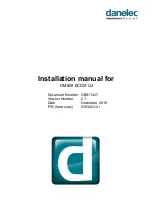
58 | Ottobock
E-MAG Active
45
1
2
3
4
5
46
47
48
Insert the electronics into the receptacle (Figure 49) and fasten the component with the enclosed
screws (Figure 50) at a maximum torque of 1 Nm. Please observe the precise positioning of the
electronics and the receptacle (see Figure 49/50).
49
50
CAUTION
Risk of injury due to incorrectly bonded system joint bar.
The patient may fall and sustain injury if
the bars loosen from the joint connections. Therefore, before the final fitting of the orthosis, glue all
system joint bars with 636W28 Adhesive. Roughen the joint bars and degrease them before bonding.
Summary of Contents for E-MAG Active 17B202N
Page 2: ......















































